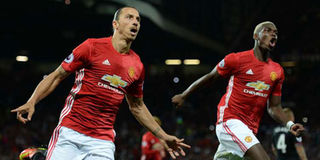Manchester, divided by football, united by music

Manchester United's Swedish striker Zlatan Ibrahimovic (left) celebrates with French midfielder Paul Pogba after scoring their second goal from the penalty spot during their English Premier League match against Southampton at Old Trafford on August 19, 2016. PHOTO | AFP |
What you need to know:
- Jose Mourinho and Pep Guardiola will represent Manchester's rival football clans on Saturday
- The northwest England city is also the home of The Smiths, Joy Division, the Stone Roses and Oasis.
MANCHESTER
Manchester marches to a derby drumbeat this weekend, as Manchester United and Manchester City do battle at Old Trafford, but it has long been a city of distinctive rhythms.
Jose Mourinho and Pep Guardiola will represent Manchester's rival football clans on Saturday, but the northwest England city is also the home of The Smiths, Joy Division, the Stone Roses and Oasis.
Once a seat of industry renowned for its cotton mills, canals and red-brick streets, the modern Manchester is a vibrant cultural hub where football and music go hand in hand.
"Music and football have been seized upon because they are clear symbols of the success of the city," Professor Nick Crossley, a sociologist from the University of Manchester, told AFP.
"Regional identity is important. Mancunians have a very strong identity and like to celebrate their successes, particularly at the expense of southerners and Liverpool."
For roughly 30 years after rock music arrived in Britain in the mid-1950s, the country's biggest bands predominantly came from cities other than Manchester.
Liverpool, most significantly, had The Beatles, and the major rock groups of the 1960s and 1970s — the Rolling Stones, The Who, The Kinks, Pink Floyd, Led Zeppelin — all hailed from London.
Punk, which burst violently into life in the late 1970s, also owed its existence to bands from the capital like The Clash, The Jam and the Sex Pistols.
But Professor Crossley says a desire to establish a punk scene in Manchester led to the creation of "dense music networks" in the city.
Come the 1980s, local bands like The Smiths and New Order rose to national prominence.
'MADCHESTER'
As the decade wore on, a new sound emerged, blending alternative rock, jangling psychedelia and electronic music.
It was heavily drug-influenced, spawned its own distinctive look — floppy hats, flared jeans and brightly coloured, oversized T-shirts — and became known as 'Madchester'.
At around the same time, a young group of footballers at Manchester United were beginning to make waves in the club's youth team.
Paul Scholes, Nicky Butt and Gary and Phil Neville, all locally born, were joined by Welshman Ryan Giggs and Londoner David Beckham in an all-conquering side that became known as the Class of '92.
They would form the core of United's first team under Alex Ferguson and when they hit the town, they visited places synonymous with the Madchester scene such as the fabled Hacienda nightclub.
"Growing up in Manchester in the 90s was just massive," Butt, now a United academy coach, explains in 'The Class of '92', the film that charts the players' exploits.
"We would be going to the Hacienda, the Boardwalk, to concerts like Spike Island. It was a special time.
"I remember one time the whole Man United team went to the Hacienda. It wouldn't happen nowadays."
'FOOTBALL MENTALITY'
Madchester, in turn, influenced Oasis, perhaps the most famous Manchester band, whose perennially warring brothers, Noel and Liam Gallagher, would become perhaps City's most famous fans.
Noel, in particular, has almost become part of the furniture at the Etihad Stadium and recently interviewed City manager Guardiola for the club website.
"The link (between football and music) began to build probably at the end of the 80s," says Dave Haslam, a former Hacienda DJ who has written several books on Manchester's music scene.
"It became much stronger when we had the young Manchester United team of the first half of the 90s and Oasis at the same time.
"The Smiths were not interested in channelling local pride. But Oasis thought being from Manchester was something to be proud of.
"That was more a football mentality. That's an important ingredient in the story of local pride and football."
Other City supporters from Manchester's rock music scene include Johnny Marr, guitarist in The Smiths, and Ian Curtis, the late Joy Division frontman.
But Richard Ashcroft, lead singer of The Verve, is a United fan, along with Shaun Ryder from the Happy Mondays and Mick Hucknall of Simply Red fame.
Affinities within the Stone Roses are split. Reni, the drummer, is a City fan, but frontman Ian Brown, guitarist John Squire and bassist Mani are all Reds.
A Roses song, 'This is the One', is played immediately before the teams emerge at the start of every United home game.
In a fitting fusion of Manchester music and Manchester football, it will be the last song to hold the attention of the crowd before hostilities commence on Saturday.





